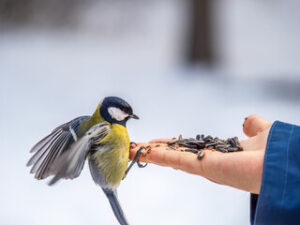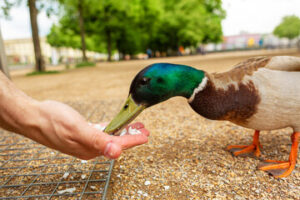
The tradition of offering sweets to birds to invite good karma is deeply embedded in ancient wisdom and cultural practices. By feeding and caring for these creatures, you connect with nature and demonstrate compassion for all living beings. This practice is not just about providing food; it is believed to positively influence one’s planetary situation and help alleviate karmic burdens from past lives that may be affecting one’s present life.
Additionally, this act offers crucial support to birds, especially during harsh winters and hot climates. Your kindness helps ensure their survival and brings you the joy of seeing them nourished and hydrated. The connection formed with the birds through this practice offers a deep sense of fulfillment, as watching thirsty birds drink the water you provide evokes emotions that words cannot fully describe. Embracing this age-old tradition can create a profound sense of harmony and interconnectedness with the world, enriching our lives in ways that deeply resonate with the human spirit.
Historical Roots
From the Egyptians to the Greeks and the Hindus, many ancient civilizations had rituals involving birds. The Egyptians, for instance, considered the ibis sacred, while in Greek mythology, birds were often associated with gods and omens. Over the centuries, these practices evolved but retained their core essence.
Spiritual Beliefs and Practices
In many spiritual traditions, the act of feeding birds is linked to the concept of karma. By performing a selfless act, such as feeding birds, individuals believe they accumulate positive karma, which can bring good fortune and spiritual benefits. Sacred texts across various religions often reference this practice, highlighting its significance.
Birds as Messengers of the Divine
Birds are frequently seen as messengers from the divine in mythology and folklore. For example, in Norse mythology, Odin’s ravens, Huginn and Muninn, are known to bring information from all over the world. Similarly, in Hinduism, the Garuda is a divine eagle-like figure that serves as Vishnu’s mount.
Benefits of Offering Sweets to Birds
Feeding birds isn’t just beneficial for them; it’s good for us too. Physically, it provides birds with an easy source of nutrition, especially in urban areas where food might be scarce. Psychologically, the act of feeding birds can be incredibly fulfilling, reducing stress and enhancing one’s sense of well-being.

Types of Sweets Traditionally Offered
Different cultures use various types of sweets for this practice. In India, for example, people often offer jaggery or sweet rice. It’s important to consider the nutritional needs of birds, ensuring that the sweets provided are safe and beneficial for them.
The Right Way to Offer Sweets
While the intention behind feeding birds is pure, it’s essential to do it right. Use natural, unprocessed sweets and avoid anything harmful like chocolate or artificial sweeteners. Place the food in safe locations, away from predators and human disturbances.
Environmental Impact
Feeding birds can positively impact local ecosystems by supporting avian populations. However, it’s crucial to do so responsibly to avoid potential negative impacts, such as dependency on human-provided food or attracting pests.
Modern Interpretations and Practices
Today, people continue to adapt this ancient practice. Urban parks, gardens, and even balconies serve as modern venues for feeding birds. This practice has also found its way into various community activities and events aimed at promoting environmental conservation.
Scientific Perspective
Recent studies highlight the psychological benefits of interacting with birds. Observing and feeding birds can reduce stress and promote mental health, supporting the age-old belief in the positive karma associated with this practice.

Case Studies
Looking at specific cultures, we see a rich tapestry of practices. In Japan, people celebrate the festival of “Tori-no-Ichi,” where offerings are made to birds for good fortune. Personal stories often recount profound experiences and perceived blessings resulting from feeding birds.
Common Misconceptions
There are several misconceptions about feeding birds. Some people think any type of food is suitable, which isn’t true. Addressing these myths helps in promoting responsible and beneficial practices.
How to Get Started
If you’re inspired to start feeding birds, begin with small steps. Research the types of birds in your area and what they like to eat. Invest in a bird feeder and choose natural, safe foods. There are plenty of resources and guides available to help you get started.
Conclusion
The tradition of offering sweets to birds is more than just a simple act of feeding. It’s a practice rooted in ancient wisdom and cultural traditions, carrying profound spiritual significance. Whether you’re seeking to invite good karma, connect with nature, or simply enjoy a peaceful moment, feeding birds can be a fulfilling and meaningful activity.
FAQs
Why is feeding birds considered good karma?
Feeding birds is seen as a selfless act that helps creatures in need, thus accumulating positive karma and bringing good fortune.
Are there specific types of birds that are more significant?
While all birds are considered significant, certain cultures revere specific birds, like crows in Hinduism or ravens in Norse mythology.
Can offering other types of food have the same effect?
Yes, offering grains, seeds, or other natural foods can also invite good karma and are often better for the birds than sweets.
How often should one feed birds to invite good karma?
There’s no set frequency, but regular feeding can help maintain a positive karmic practice and support local bird populations.
What are some common mistakes to avoid when feeding birds?
Avoid processed foods, chocolate, and artificial sweeteners. Ensure the feeding area is safe from predators and clean up regularly to prevent attracting pests.







